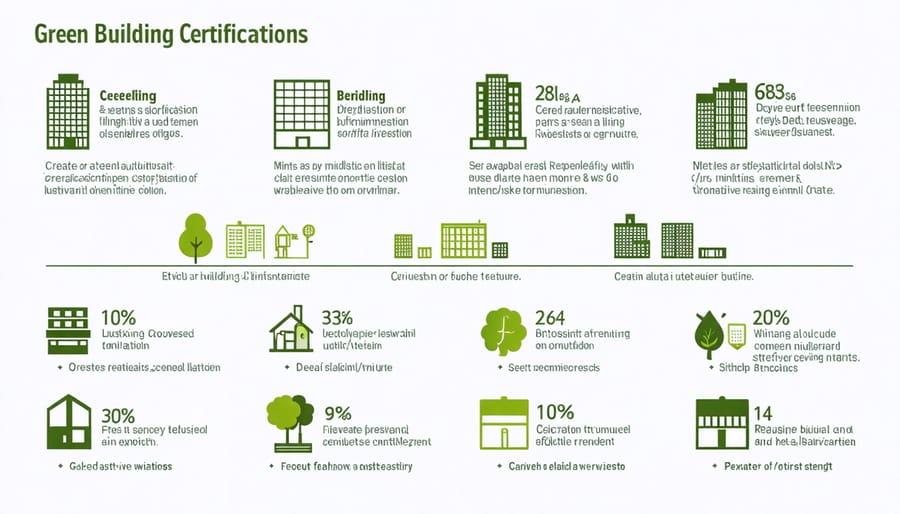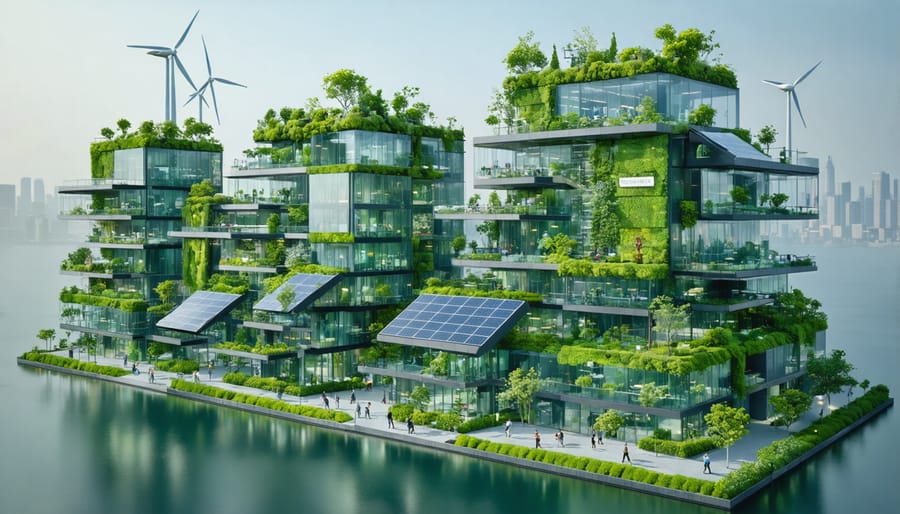The rapid expansion of renewable energy has created unprecedented opportunities for construction professionals seeking high-paying sustainability careers in the built environment. Solar installation managers now command salaries exceeding $100,000 annually, while green building consultants routinely secure six-figure contracts across major metropolitan markets. Wind energy construction specialists, particularly those with mechanical engineering backgrounds, are experiencing a 63% growth rate in job opportunities, making this sector one of construction’s fastest-growing specializations.
Professional certifications in LEED, WELL, and renewable energy systems installation have become essential credentials, offering immediate pathways into specialized roles with significant advancement potential. The convergence of traditional construction expertise with sustainable technology implementation has created a unique demand for professionals who can bridge both worlds, particularly in commercial and industrial sectors where energy efficiency requirements continue to evolve.
This transformation presents an unprecedented opportunity for construction professionals to position themselves at the forefront of the industry’s sustainable future while securing roles that offer both financial rewards and meaningful environmental impact.
The Booming Green Building Industry

Market Growth Statistics
The green energy sector within construction continues to experience remarkable growth, with the global sustainable building market reaching $264.3 billion in 2022. Industry analysts project this value to exceed $523 billion by 2027, representing a compound annual growth rate (CAGR) of 14.6%.
Private investment in green building technologies hit record levels in 2022, with venture capital firms investing over $8.2 billion in sustainable construction startups. Solar integration projects lead the growth metrics, accounting for 42% of all green energy implementations in commercial buildings.
Employment statistics reflect this robust market expansion, with green building jobs growing 30% faster than traditional construction roles. The U.S. Bureau of Labor Statistics forecasts a 105% increase in solar installer positions and an 89% rise in wind turbine technician roles through 2030, marking them among the fastest-growing occupations nationwide.
Corporate commitments to carbon neutrality are driving significant investments, with 67% of Fortune 500 companies pledging to achieve net-zero emissions by 2040. This translates to an estimated $3.4 trillion in green building renovations and new construction projects over the next decade.
Regulatory Drivers
Several key regulatory drivers are shaping the demand for green building professionals across the construction industry. The Paris Agreement and subsequent national climate commitments have led to stricter building codes and energy efficiency standards, creating numerous opportunities for specialists in sustainable construction. In the United States, programs like LEED certification and the International Green Construction Code (IgCC) have become increasingly mandatory for new commercial projects in many jurisdictions.
State and local governments are implementing aggressive clean energy mandates, with many requiring new construction to meet specific sustainability benchmarks. California’s Title 24 energy code and New York City’s Local Law 97, for instance, have created substantial demand for professionals with expertise in energy-efficient building systems and renewable energy integration.
Federal incentives, including tax credits and grants through the Inflation Reduction Act, are driving investment in green building projects and renewable energy installations. These regulatory frameworks, combined with corporate sustainability commitments and ESG reporting requirements, are creating a robust job market for professionals with green building expertise. The trend toward stricter environmental regulations suggests continued growth in career opportunities across the sustainable construction sector.
High-Demand Green Building Career Paths

Sustainable Design Architects
Sustainable Design Architects play a pivotal role in shaping the future of green building, combining architectural expertise with environmental consciousness. These professionals typically need a master’s degree in architecture with specialized training in sustainable design principles and green building certification systems like LEED, BREEAM, or WELL.
Core responsibilities include developing environmentally responsible building designs, selecting sustainable materials, integrating renewable energy systems, and optimizing building performance through passive design strategies. They collaborate with engineers, contractors, and clients to ensure projects meet both sustainability goals and functional requirements while maintaining aesthetic excellence.
Technical proficiency in building information modeling (BIM) software, energy modeling tools, and sustainability analysis platforms is essential. Strong analytical skills are required to evaluate environmental impact assessments and perform life-cycle analyses of building materials and systems.
Career progression often starts with junior architect positions, advancing to project architect and eventually leading sustainable design teams or establishing specialized sustainable architecture practices. Many professionals pursue additional certifications such as LEED AP, Living Future Accreditation, or Passive House Designer to enhance their expertise.
The role demands continuous learning as green building technologies and regulations evolve. Successful sustainable design architects often become thought leaders in the field, contributing to industry standards and inspiring innovative approaches to environmental design challenges.
Average annual salaries range from $65,000 for entry-level positions to $120,000+ for senior roles, with experienced principals commanding higher compensation packages.
Energy Efficiency Consultants
Energy efficiency consultants play a pivotal role in shaping energy-efficient construction careers by bridging the gap between traditional building practices and sustainable solutions. These professionals conduct comprehensive energy audits, analyze building performance data, and develop strategies to optimize resource consumption while maintaining operational efficiency.
Qualified consultants typically hold degrees in engineering, architecture, or environmental science, complemented by specialized certifications such as LEED AP, Certified Energy Manager (CEM), or Building Energy Assessment Professional (BEAP). Industry experience in building systems, energy modeling, and sustainability practices is essential for success in this role.
The market demand for energy efficiency consultants continues to surge, driven by stringent environmental regulations, rising energy costs, and increasing corporate sustainability commitments. According to recent industry reports, the employment growth rate for these professionals is projected to exceed 15% over the next five years, particularly in metropolitan areas with ambitious climate action plans.
Consultants work closely with architects, contractors, and building owners to integrate energy-efficient technologies, recommend cost-effective improvements, and ensure compliance with green building standards. Their expertise extends to renewable energy integration, building automation systems, and performance verification, making them invaluable assets in the sustainable construction ecosystem.
Success in this field requires strong analytical skills, proficiency in energy modeling software, and excellent communication abilities to effectively convey technical recommendations to diverse stakeholders.
Green Building Project Managers
Green Building Project Managers play a pivotal role in orchestrating sustainable construction initiatives, ensuring projects meet environmental standards while maintaining budget and timeline constraints. These professionals serve as the crucial link between architects, contractors, suppliers, and stakeholders, coordinating all aspects of green building projects from conception to completion.
Key responsibilities include developing and implementing sustainable project plans, managing LEED certification processes, coordinating with environmental consultants, and ensuring compliance with green building codes and regulations. They oversee material procurement, focusing on sustainable and recycled materials while evaluating their environmental impact and cost-effectiveness.
The growth trajectory for Green Building Project Managers is particularly promising, with the sustainable construction sector experiencing consistent expansion. Career advancement opportunities include positions such as Sustainability Director, Green Building Program Manager, or Chief Sustainability Officer. Industry data indicates a 15% growth rate in demand for these positions over the next five years.
Successful professionals in this role typically combine traditional project management expertise with specialized knowledge in sustainable building practices, energy efficiency systems, and environmental regulations. Many enhance their careers by obtaining certifications like LEED AP, WELL AP, or Green Globes Professional.
Compensation reflects the specialized nature of the role, with experienced Green Building Project Managers earning between $85,000 to $150,000 annually, depending on location and project scope. The position offers both professional satisfaction and the opportunity to make a meaningful impact on environmental sustainability.
Renewable Energy Systems Specialists
Renewable Energy Systems Specialists play a crucial role in designing, implementing, and maintaining sustainable power solutions for construction projects. These professionals typically need a bachelor’s degree in electrical, mechanical, or energy engineering, with many employers preferring candidates who hold advanced degrees or specialized certifications in renewable energy technologies.
Key technical requirements include proficiency in energy modeling software, understanding of electrical systems design, and extensive knowledge of various renewable technologies including solar PV, wind power, and energy storage systems. Specialists must stay current with rapidly evolving industry standards, building codes, and energy efficiency regulations.
The career outlook is particularly promising, with the Bureau of Labor Statistics projecting a 25% growth rate through 2030. Specialists can expect starting salaries ranging from $65,000 to $85,000, with experienced professionals earning well over $100,000 annually.
Industry opportunities span various sectors, including:
– Construction firms specializing in green buildings
– Engineering consultancies
– Renewable energy developers
– Government agencies
– Utility companies
– Research institutions
Success in this role requires strong analytical skills, project management capabilities, and the ability to collaborate with multiple stakeholders. Professionals should also develop expertise in energy assessment tools, sustainability certification processes, and financial analysis of renewable energy investments.
Regular participation in industry conferences, continuing education programs, and professional associations helps maintain competitive edge in this dynamic field.
Essential Qualifications and Certifications
Professional Certifications
Professional certifications play a crucial role in establishing credibility and expertise in the green energy sector. The North American Board of Certified Energy Practitioners (NABCEP) certification stands as the industry’s gold standard, particularly for solar energy professionals. This certification demonstrates comprehensive knowledge of photovoltaic system design, installation, and maintenance.
For energy efficiency specialists, the Building Performance Institute (BPI) certification provides essential credentials. The BPI Building Analyst certification is particularly valuable for professionals focusing on building envelope and energy assessment roles.
The Leadership in Energy and Environmental Design (LEED) Green Associate and LEED AP credentials, offered by the U.S. Green Building Council, are essential for professionals working on sustainable building projects. These certifications validate expertise in green building practices and sustainable design principles.
The Association of Energy Engineers offers the Certified Energy Manager (CEM) designation, which is highly regarded for professionals specializing in energy management and optimization. This certification requires extensive experience and demonstrates advanced knowledge of energy systems and conservation strategies.
For wind energy professionals, the Global Wind Organisation (GWO) certification ensures safety and technical competency. Additionally, the Energy Management System Implementation (EnMS) certification following ISO 50001 standards is valuable for professionals involved in organizational energy management.
These certifications typically require a combination of education, experience, and passing comprehensive examinations. Many employers prioritize certified professionals, making these credentials valuable assets for career advancement in green energy.

Technical Skills and Knowledge
Success in green energy careers demands a robust combination of technical expertise and interpersonal capabilities. Professionals must possess strong foundations in engineering principles, particularly in renewable energy systems, electrical systems, and sustainable building technologies. Understanding building codes, energy modeling software, and sustainability certification systems like LEED is crucial.
Core technical competencies include proficiency in digital construction skills, renewable energy system design, and energy efficiency analysis tools. Knowledge of building automation systems, smart grid technologies, and energy storage solutions is increasingly valuable. Professionals should also be well-versed in project management software and building information modeling (BIM) platforms.
Equally important are soft skills that enable effective collaboration and project execution. These include critical thinking, problem-solving abilities, and strong communication skills to explain complex technical concepts to diverse stakeholders. Project management capabilities, attention to detail, and adaptability are essential for navigating evolving industry standards and technologies.
Additional valuable skills include data analysis, cost-benefit assessment, and understanding of environmental regulations. Familiarity with emerging technologies like IoT sensors, energy management systems, and renewable energy integration methods positions professionals for long-term success in this rapidly evolving field. Continuous learning and staying current with industry innovations are crucial for career advancement.
Getting Started in Green Building
Entering the green building industry requires a strategic approach to construction career development with a focus on sustainable practices. Start by obtaining relevant certifications such as LEED Green Associate or BREEAM Assessor credentials, which demonstrate your commitment to sustainable construction principles and increase your marketability.
Professional organizations like the U.S. Green Building Council (USGBC) and the International Living Future Institute offer valuable resources, networking opportunities, and continuing education programs. These connections can be instrumental in accessing job opportunities and staying current with industry trends.
Gain hands-on experience through internships or entry-level positions with firms specializing in sustainable construction. Focus on developing expertise in energy modeling, renewable energy systems, and sustainable materials. Many established construction companies now have dedicated green building divisions, offering opportunities to learn while contributing to meaningful projects.
Consider pursuing advanced education in sustainable architecture, engineering, or construction management. Many universities offer specialized programs that combine traditional construction knowledge with sustainable practices. Stay informed about building codes, energy regulations, and environmental standards, as these frequently evolve and impact green building practices.
Develop proficiency in green building software tools like energy modeling programs and building information modeling (BIM) systems. These technical skills, combined with knowledge of sustainable practices, will position you as a valuable asset in the growing green building sector.
The green building sector continues to experience remarkable growth, offering abundant career opportunities for construction professionals. Industry projections indicate a sustained expansion of sustainable construction practices, with experts forecasting a 15% increase in green building jobs over the next five years. This growth is driven by stricter environmental regulations, increasing client demand for sustainable buildings, and advancing technologies in renewable energy systems.
For professionals seeking to enter or advance in this field, the combination of technical expertise, sustainability knowledge, and project management skills will remain highly valuable. The sector offers competitive salaries, with senior positions commanding six-figure compensation packages. As cities worldwide commit to carbon reduction goals and sustainable development, the demand for qualified green building professionals will only intensify, making this career path both financially rewarding and environmentally impactful.
Investing in green building expertise today positions professionals at the forefront of construction industry innovation, ensuring long-term career stability and growth potential.

